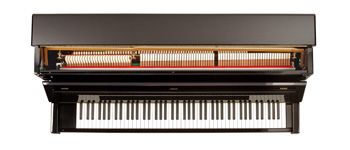„A Bechstein is surely one of the very best pianos that are built today and are especially characterized by their noble tone fullness, sweet and nevertheless sublime.“
Wilhelm Furtwängler
Wilhelm Furtwängler, born 1886 in Berlin, succeeded in 1920 Richard Strauss as conductor of the orchestra of the Berlin Staatsoper. Two years later he relieved Arthur Nikisch as director of the Berlin Philharmonic and Gewandhausorchester Leipzig. In 1928, when, in addition to the Berlin Philharmonic, he was able to take over the Vienna Philharmonic, Furtwängler gave up direction of the Gewandhausorchester. Three years later it became incumbent upon him and Arturo Toscanini to assume complete direction of the Bayreuth Festival. As the Allied Control Counsel divested Wilhelm Furtwängler of his office due to his cooperation with the national socialist regime, he moved to Clarens on the Lake Geneva. In the following year, he was absolved from the accusation and once again authorized to direct the Berlin Philharmonica. In 1951, he opened the first Bayreuth Festival after World War II with Beethoven's 9th Symphony. Wilhelm Furtwängler died on November 30, 1954, in Baden-Baden. Furtwängler appeared also as composer and pianist, was connected with the Bechstein brand all his life, owned a Bechstein grand piano and stated, "A Bechstein is surely one of the very best pianos that are built today and are especially characterized by their noble tone fullness, sweet and nevertheless sublime."
Photo: © C. Bechstein Archiv




















